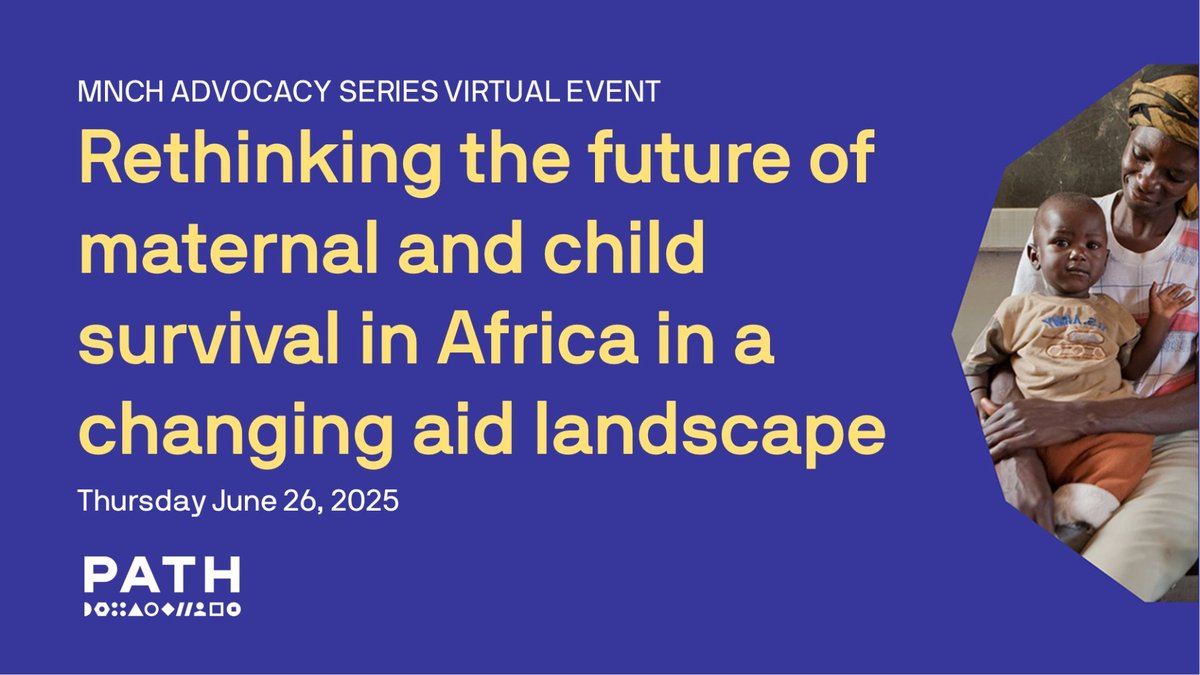Sub-Saharan Africa continues to experience the highest burden of maternal, newborn, and child mortality and stillbirths. With less than six years to the 2030 Sustainable Development Goals (SDGs), the majority of African countries are projected to miss maternal, newborn, and child health (MNCH) targets. Amid this health crisis, global financing for health is undergoing significant shifts, with donor contributions declining. This evolving landscape underscores the urgent need for African governments to increase domestic health investments, elevate MNCH on national agendas, and fulfill their existing commitments.
Recognizing the urgent need for acceleration and the challenges countries face, PATH’s Center for Advocacy and Policy hosted a webinar titled “Rethinking the future of maternal and child survival in Africa in a changing aid landscape.” The first of a two-part webinar series focused on MNCH financing in Africa, this session explored how the shifting aid dynamics are impacting MNCH in Africa and emphasized the need for collective action, sustainable funding, and innovative partnerships.
The webinar brought together 93 participants from 28 countries, featuring contributions from policymakers, advocates, community voices, and technical partners representing the United Nations Children’s Fund (UNICEF), the African Union Commission, Nigeria’s Ministry of Health, Umzanyana Birth Services, MSD for Mothers, and PATH.
Progress toward MNCH goals
Sub-Saharan Africa continues to bear a disproportionate burden of maternal, newborn, and child mortality, accounting for over 70 percent of global maternal deaths in 2023. According to Tomomi Kitamura, a health specialist at UNICEF, 1 in 38 babies in the region do not survive the first month of life, and 1 in 15 children die before their fifth birthday. Furthermore, current trends indicate that 70 percent of countries projected to miss the SDGs for maternal and child health by 2030 are in sub-Saharan Africa.
Speaking during the webinar, Tomomi pointed out several key barriers hindering progress. These include low service coverage, significant disparities in service access between urban and rural areas, outdated data on actual MNCH progress, and limited access to lifesaving commodities. She emphasized that accelerating progress toward the 2030 SDGs requires strengthening primary health care systems to ensure available, accessible, and high-quality care for mothers, newborns, and children.
Tomomi also stressed the importance of providing governments with the support needed to mobilize more resources, which can be done by providing reliable and timely data to build strong investment cases. Additionally, she highlighted the importance of updating and strengthening data systems in order to track progress, identify challenges, and guide targeted interventions that can drive meaningful improvements in the acceleration agenda for maternal and child health outcomes.
Africa’s push for maternal and child health in a changing landscape
In light of the evolving financing landscape, the African Union Commission emphasized the critical need for preserving and advancing the gains made in MNCH across the continent. Commission representative Alleluia Delphine, who leads the Campaign on Accelerated Reduction of Maternal Mortality in Africa (CARMMA Plus), underscored that maternal and child survival is not solely a technical matter but a deeply political one that demands prioritization at the highest levels. She affirmed the Commission’s commitment to working closely with member states to ensure that health remains central to national agendas, in alignment with the Abuja Declaration. This includes moving from mere political commitments to actual budgetary allocations, political prioritization, progress tracking, and data utilization to guide planning and budgeting.
“Maternal and child survival is not solely a technical issue but a political imperative.”— Alleluia Delphine, CARMMA Plus Lead, African Union Commission
Alleluia added that while Africa has the solutions to address MNCH challenges, scaling them effectively is essential. She highlighted the value of south-to-south collaboration and the need to strengthen partnerships that are grounded in mutual respect, African ownership, and long-term sustainability.
Strategies to sustain the gains and accelerate progress
Part of the webinar featured a panel discussion on strategies to sustain the gains in MNCH while accelerating progress to reach the SDG targets. Dr. Samuel Oyeniyi, the director and acting head of the reproductive health division at Nigeria’s Federal Ministry of Health and Social Welfare, outlined several innovative strategies that Nigeria has employed. These include implementing and adopting national policies through agreements with state governors and expanding health insurance coverage, ensuring communities have continued access to health care. Nigeria is also investing in local manufacturing of medical supplies to manage the cost of commodities and has launched a national emergency transport system to improve access to facilities.
Nonkululeko Shibula, founder of Umzanyana Birth Services in South Africa, shared her personal experience as a grieving mother and emphasized the need for empathetic care, especially for women experiencing stillbirths. She advocated for the establishment of bereavement protocols, comprehensive antenatal education, and holistic physical and mental support for mothers. Finally, Iyadunni Olubode, who leads MSD for Mothers programs in Kenya and Nigeria, highlighted the role of public-private partnerships in driving sustainable progress. She stressed the importance of government-led, data-driven, cost-effective, and collaborative solutions to accelerate progress.
Collectively, these recommendations represent a multisectoral, people-centered approach to accelerating MNCH outcomes across Africa.
As Africa navigates a shifting aid landscape, the urgency to protect and advance MNCH has never been greater. The insights shared during this webinar underscore that while the challenges are significant, so too is the potential for progress. By investing in resilient health systems, fostering empathetic and inclusive care, and strengthening partnerships rooted in local leadership and sustainability, African countries can chart a bold path forward toward attaining health goals for women and children.
The full English webinar recording can be accessed here.
Click here to register for part two of the regional MNCH advocacy dialogue on “Rethinking the future of maternal and child survival in Africa in a changing aid landscape,” scheduled for July 30, 2025.



